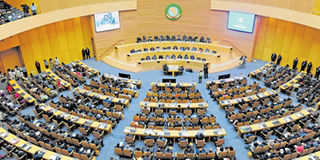All you need to know about the African Union’s money

The African Union in session in Addis Ababa. PHOTO | FILE
What you need to know:
- There is this financial report for December 2014 that was published in June 2015. The accounts were audited by an AU board of external auditors, with membership from South Africa, Uganda, Algeria, Cape Verde and Equatorial Guinea.
But what do we know about the AU, the body that strives to promote the peace, security, and solidarity of its 54 members states?
There is this financial report for December 2014 that was published in June 2015. The accounts were audited by an AU board of external auditors, with membership from South Africa, Uganda, Algeria, Cape Verde and Equatorial Guinea.
The accounts, with all figures in US dollars, were prepared using International Public Sector Accounting Standards (IPSAS) and, as permitted in the year of IPSAS adoption, comparative information for the previous years was not been provided.
Without figures for more than one year, it is not easy to compare AU performance and see financial trends.
Total revenue for the year was $938 million and expenses were $238 million with another $390 million spent on peace and security operations, leaving a surplus for that year of $310 million.
Included in the revenue was $126 million in contributions from member states. Of this, $72 million constituted payments for the current year, $25 million in arrears and $10 million in contributions received in advance, with the bulk from Angola, which was a wise move given that oil prices have since slumped, leading to a budget crisis there.
Member states send their contributions to the AU in Addis Ababa, which then pays out the money to various AU offices and agencies in places like Algiers, Belgium, Geneva, Abuja, Niamey, Washington and New York. But the bulk of the money, almost $200 million, was spent at the AU headquarters in Addis Ababa, and this included staff salaries of $74 million and $80 million for operations.
There were also employee benefits of $14 million and an exchange loss of $19 million incurred in Addis, which had $243 million in the bank at the end of the year.
Nairobi also got a huge chunk of almost $15 million for the Inter-African Bureau for Animal Resources based at Museum Hill, and with $19 million at the end of that year, Nairobi was the only AU office that had over one million dollars outside of the Ethiopian capital.
In the report, the AU thanks numerous development partners who fund much of their programme budgets through generous support.
These include the European Commission, governments of the UK, Sweden, Norway, Germany, China, Japan, USA, Italy, Finland, Turkey, South Korea, Netherlands, as well as the World Bank, African Development Bank, Ford Foundation, and Bill and Melinda Gates Foundation. The amount realised from partner funds was $462 million.
The AU also recorded $368 million of in-kind contributions from the governments of Ethiopia and China. The government of Ethiopia donated five pieces of land worth $282 million on which the headquarters sits, and which has a 19-storey conference building put up by the government of China for $86 million.
There was also AU support to other AU organs, such as the Pan-African Parliament ($11 million), Nepad ($6 million), and the African Court of Human and Peoples’ Rights ($4 million).
The accounts of these institutions were not included in the AU’s books, as the AU does not control them and they are all required to prepare separate accounts.
Of the peacekeeping amount of $390 million, most of it - $320 million - was spent on allowances for peacekeepers, with $33 million going to rations and $13 million to death grants.
The AU also had special funds, such as for the acquisition of AU property ($85 million), and an emergency fund for drought ($9 million) and another for refugees ($4 million). From 2012 onward, an appropriation of 20 per cent of the surplus was to be made towards the acquisition of AU property.
The statement notes that a peace and security building was being constructed with assistance from the German government that will only be added to the AU books after it is completed and handed over.
Twitter: @bankelele




